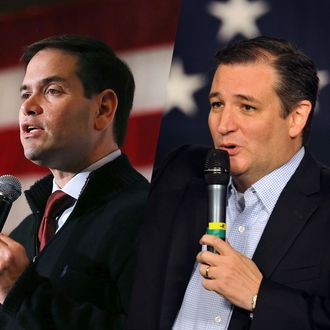
For Republicans alarmed by what Donald Trump might do (whether or not he wins the presidential nomination) to the GOP share of the Latino vote, a contest that boils down to Cuban-Americans Marco Rubio and Ted Cruz might seem to be the antidote. Surely a Latin-inflected final round of the primaries would allay suspicions of an essentially nativist GOP! Some Republicans might even fantasize that the more ethnically self-conscious Rubio in particular could actually boost GOP performance among Latinos to something near the majority he commanded in his 2010 Senate race in Florida.
You never know, but there are abundant reasons Rubio (or any other Cuban-American) might struggle with the larger Latino electorate, and not just because he’s repudiated his sponsorship of comprehensive immigration-reform legislation and generally espoused a very conservative agenda.
As Jonathan Cohn pointed out back in 2011, Rubio only won a majority of Florida Latinos in 2010 because he won 80 percent of the Cuban-American vote. The 40 percent he won among non-Cuban Latinos against an opposition divided between vanquished Republican incumbent Charlie Crist and weak Democrat Kendrick Meek wasn’t really all that impressive.
And as Mary Jordan shows today in an important Washington Post dispatch from Las Vegas (where Rubio, who lived there as a child, is making a major effort), many Mexican-Americans just don’t think of Cuban-Americans as their ethnic relatives.
Mexicans account for nearly two-thirds of the Latinos in the United States — about 35 million people. Cubans are the third-largest group, after Puerto Ricans, with just 2 million people, or only 3.7 percent of the Latino vote, according to the Pew Research Center.
In interviews in wedding chapels and casinos, all around this city of stretch limos, slot machines and neon signs, Mexicans who make up so much of the workforce said it would be far more meaningful to elect the first Mexican American president than the first Latino. Many said they would vote for a non-Latino over a Cuban American.
Some of this estrangement involves cultural differences, and some stems from resentment at variable treatment by U.S. authorities:
Part of the friction between Mexicans and Cubans comes from the starkly different reception they get when they arrive in the United States. Cubans who reach U.S. shores are almost automatically granted residency and eligibility for food stamps and other welfare benefits because of a special policy for those coming from the communist island — many arriving through Mexico. Mexicans who enter without legal papers live under the threat of deportation.
There are cultural distinctions, too. They speak with different accents, celebrate different customs and eat different foods. Mexico is soccer-obsessed, while Cuba loves baseball.
“Except for the fact that they both speak Spanish, everything else is totally different,” said Carlos Artiles, 50, a bartender at the Florida Café Cuban Bar & Grill, where the eggs come with stuffed potatoes and fried plaintains. Artiles, a Cuban, quickly became a citizen, but he sees firsthand how Mexicans, including his wife, try unsuccessfully for years and “pay thousands of dollars to attorneys to help. It’s completely unfair.”
There are also local factors. As Jordan notes, many Cubans who worked in the casino industry in Havana migrated to Las Vegas when Castro took over. So they tend to have an “outsize influence” in Nevada even though they are vastly outnumbered by Mexican-Americans.
The bottom line is that it’s unclear if either Cuban-American would have as strong an appeal to Latinos generally as, say, Jeb Bush, who unlike Cruz is fluent in Spanish and Catholic, and unlike Rubio has a Mexican-American wife. And it’s even more unclear whether any Republican could match George W. Bush’s robust 2000 performance in a contest with Hillary Clinton, who clobbered Barack Obama among Latinos in the 2008 primaries.
In reality, Ted Cruz, a Southern Baptist whose positions on immigration policy earned him the endorsement of hypernativist Steve King, has no natural appeal to Latinos beyond his name. But no one should assume Rubio’s golden in this constituency, either. He may spend the entire primary season trying to wipe out everything about his record and his persona that would make Latinos resist the Democratic proclivities they so clearly show.






























